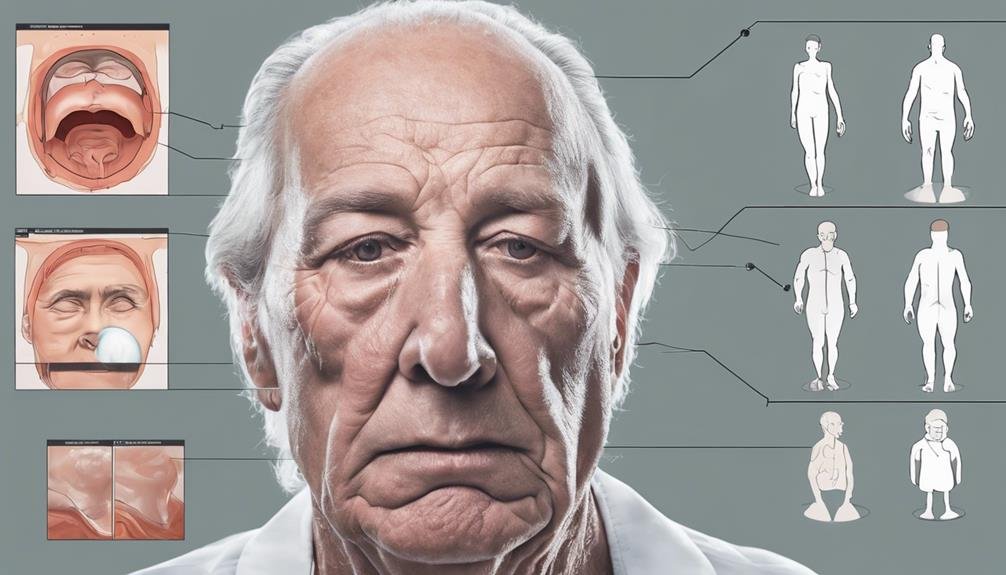Like a double-edged sword, HGH supplements can offer benefits but also pose risks to your health. Cardiovascular complications, increased risk of diabetes, hormonal imbalances, joint, and muscle pain, and the potential for acromegaly are just a few of the concerns associated with these supplements.
However, before you dismiss them entirely, it's essential to understand the nuances of these risks and how they may impact you.
Key Takeaways
- HGH supplements pose cardiovascular risks like blood pressure spikes and heart strain.
- Metabolic risks include weight gain, insulin resistance, and diabetes concerns.
- Hormonal imbalances and disruptions can lead to growth abnormalities and endocrine issues.
- Joint and muscle pain management is crucial due to common associated discomfort.
Possible Cardiovascular Complications

When considering the potential risks of HGH supplements, it's important to acknowledge the heightened risk of cardiovascular complications associated with their use. HGH supplements have been linked to blood pressure spikes, which can increase the strain on your heart and blood vessels. Elevated blood pressure is a well-known risk factor for heart disease, stroke, and other cardiovascular issues.
Additionally, these supplements may also lead to heart rhythm disturbances, disrupting the normal electrical activity of the heart. Irregular heart rhythms can predispose you to more severe conditions like atrial fibrillation or even cardiac arrest. It's critical to monitor your cardiovascular health closely when using HGH supplements, as these effects can be potentially life-threatening.
Be vigilant for any signs of chest pain, palpitations, dizziness, or shortness of breath, as these could indicate a serious underlying issue. Prioritize regular check-ups and consult your healthcare provider if you experience any concerning symptoms. Your heart health is paramount, so take proactive steps to safeguard it.
Increased Risk of Diabetes
HGH supplements pose an elevated risk of developing diabetes due to their impact on insulin sensitivity. Research indicates that HGH can lead to weight gain, which in turn can contribute to insulin resistance, a key factor in the development of type 2 diabetes. When insulin resistance occurs, the body's cells become less responsive to the hormone insulin, which is responsible for regulating blood sugar levels. This resistance can lead to elevated blood sugar levels over time, potentially resulting in diabetes.
Individuals considering HGH supplements should be aware of this potential risk and monitor their insulin sensitivity closely. Maintaining a healthy weight through diet and exercise can help mitigate the risk of developing diabetes while taking HGH supplements. It's important to consult with a healthcare provider before starting any supplementation regimen, especially if there are concerns about diabetes or insulin sensitivity. By staying informed and proactive, you can better manage the risks associated with HGH supplements and make informed decisions about your health.
Hormonal Imbalances and Disruptions

Experiencing hormonal imbalances and disruptions can greatly impact various physiological processes within the body. When contemplating the use of HGH supplements, it's vital to grasp the potential risks associated with alterations in hormone levels. Here are some key points to take into account:
- Metabolic issues: Hormonal imbalances caused by HGH supplements can disrupt metabolic functions, leading to issues such as insulin resistance and abnormal lipid profiles. These metabolic disturbances may increase the risk of developing conditions like diabetes and cardiovascular disease.
- Growth abnormalities: HGH plays a significant role in regulating growth and development. Disruptions in the normal hormonal balance can result in growth abnormalities, particularly in children and adolescents. Excessive supplementation of HGH may lead to accelerated growth and skeletal abnormalities.
- Endocrine system dysregulation: The endocrine system is a delicate network of glands that produce and regulate hormones. Introducing exogenous HGH can interfere with this system, causing dysregulation and potentially leading to a cascade of hormonal imbalances throughout the body.
Understanding the potential for hormonal imbalances and disruptions is essential when contemplating the use of HGH supplements to avoid adverse effects on health and well-being.
Joint and Muscle Pain
Joint and muscle pain can be a significant concern associated with the use of HGH supplements. Some individuals may experience discomfort in their joints or muscles as a result of taking these supplements. This pain can range from mild to severe and may impact your daily activities or exercise routine. If you encounter joint or muscle pain while using HGH supplements, it's essential to address it promptly to prevent further complications.
To mitigate joint and muscle pain, consider implementing exercise modifications. Adjusting your workout routine to reduce the strain on your joints and muscles can help alleviate discomfort. Low-impact exercises, such as swimming or cycling, may be gentler on your body while still allowing you to stay active.
Additionally, incorporating pain management strategies can aid in relieving discomfort. This may include using ice packs, taking over-the-counter pain relievers, or consulting with a healthcare provider for further guidance. It's important to listen to your body and prioritize its well-being when dealing with joint and muscle pain related to HGH supplements.
Potential for Acromegaly

The excessive production of growth hormone in the body can lead to a condition known as Acromegaly. This condition results from the overstimulation of growth hormone after the growth plates have closed, leading to several potential risks that individuals should be aware of:
- Facial Changes: Acromegaly can cause noticeable changes in facial features such as a protruding brow, enlarged nose, thickened lips, and increased spacing between teeth.
- Organ Enlargement: The excessive growth hormone can also lead to the enlargement of organs like the heart, liver, and kidneys. This can affect their function and potentially lead to serious health complications.
- Joint Problems: Acromegaly can result in joint pain, swelling, and limited mobility due to the overgrowth of tissues surrounding the joints.
It is essential to understand these risks associated with Acromegaly when considering the use of HGH supplements to make informed decisions about your health and well-being.
Frequently Asked Questions
Can HGH Supplements Cause Changes in Mood or Behavior?
HGH supplements can potentially cause changes in mood or behavior by leading to hormonal imbalance. These shifts can manifest as emotional changes, altering your personality and affecting mental health. Be cautious about these implications when considering HGH supplementation.
Are There Any Potential Effects of HGH Supplements on Fertility or Reproductive Health?
When considering HGH supplements, it's crucial to understand their impact on hormones and potential fertility risks. These supplements can affect hormone levels, potentially leading to disruptions in reproductive health. It's important to consult healthcare professionals for guidance.
Do HGH Supplements Have Any Impact on Cognitive Function or Brain Health?
Improving memory and cognitive function is essential. HGH supplements may influence brain health, potentially enhancing cognitive performance. However, be cautious as side effects or interactions could impact cognitive decline. Consult a healthcare provider for guidance.
Are There Any Known Interactions Between HGH Supplements and Other Medications or Supplements?
When combining HGH supplements with other medications or supplements, potential interactions and side effects can occur. It is important to consult healthcare providers before starting any new regimen to avoid adverse outcomes.
Can HGH Supplements Affect Hair Growth or Loss?
Monitoring any changes closely is important when using HGH supplements, as improving hair quality and growth patterns can be a potential effect of these supplements. Some individuals have reported positive changes in their hair after using them.
Conclusion
To sum up, it's vital to contemplate the potential risks associated with HGH supplements, such as cardiovascular complications, increased risk of diabetes, hormonal imbalances, joint and muscle pain, and the potential for acromegaly.
As with any supplement or medication, it's essential to consult with a healthcare professional before starting HGH therapy.
Prioritizing your health and well-being by making informed decisions can help you avoid potential complications down the road.
Stay informed, stay healthy.
